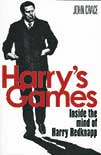 Inside the mind of Harry Redknapp
Inside the mind of Harry Redknapp
by John Crace
Constable Books, £18.99
Reviewed by Jonathan O’Brien
From WSC 318 August 2013
A little over a year ago, Harry Redknapp had it all. Spurs were well on course for a Champions League place, Redknapp himself had won his courtroom battle with the taxman and he was in pole position for the England job. And if he didn’t get the latter, he had a contingency plan for the summer: a lucrative and cushy slot analysing Euro 2012 for the BBC.
Other than the tax case, none of it worked out. Spurs tumbled into the Europa League for another year, Roy Hodgson took England to Ukraine and Redknapp is out of the top flight entirely, facing a season in the Championship with a dreadful QPR team. Even the Euro 2012 gig turned sour when Redknapp sheepishly stood down from the BBC panel after Daniel Levy called his bluff over a pay rise.
Harry’s Games, a generally positive (and occasionally adoring) biography, would have seemed well timed at another moment, but parts of it read a little strangely in the summer of 2013. Redknapp sharply divides opinion among the public: some lap up his man-of-the-people clubbability, while others see him as shady and having too many fingers in pies. John Crace writes here that the aim is to find an accurate midpoint between the two extremes, though it’s obvious the author cleaves more to the former than the latter.
A Guardian journalist and Spurs fan, Crace has been dealt a slightly awkward hand, with none of Redknapp’s friends or confidantes willing to speak to him on the record. So a lot – though not all – of the book is a cuttings job, albeit a thorough and solidly written one. The problem is that he lays his cards on the table early on and keeps them there, announcing that he’s “not ashamed to love” Redknapp and talking at length about the man’s charisma and common touch. The words “national treasure” are used, and not sarcastically. You wonder exactly how much you can trust a biographer who openly admits to being in lust with his subject.
Crace’s strengths are his thoroughness and prosecraft, and Harry’s Game is an easy, diverting read if nothing else. Redknapp’s first couple of decades in football were resolutely unglamorous: his time as an injury-plagued winger for West Ham is analysed through the prism of the fear he would have felt whenever another caveman full-back was lunging in to clatter him. Retiring early, he fetched up at Bournemouth, where his first match in charge ended in a 9-0 defeat.
The West Ham years, where Redknapp seemed to be signing four players a week at one stage, were chaotic. “Harry just loved a deal,” an anonymous former West Ham board member tells Crace. “It was almost as if it were a drug.” Crace notes later that while Redknapp has a tendency to “stay in the black” when trading players, it has a bad effect on the players themselves, who don’t like being passed around like pieces of meat.
With QPR down, few expect Redknapp to hang around for long. Crace finished the book just before the relegation and rounds it off by speculating on Redknapp’s chances of pulling off another Houdini act, to cement his reputation as “one of football’s greatest ever survivors”. Perhaps, but mere survival isn’t the kind of thing that a man like Redknapp settles for.